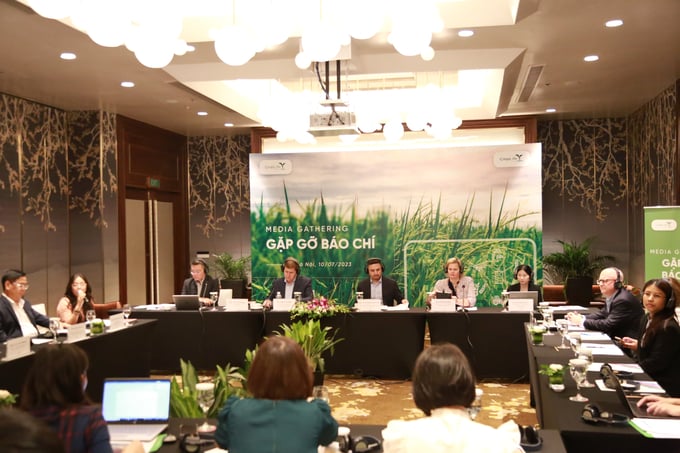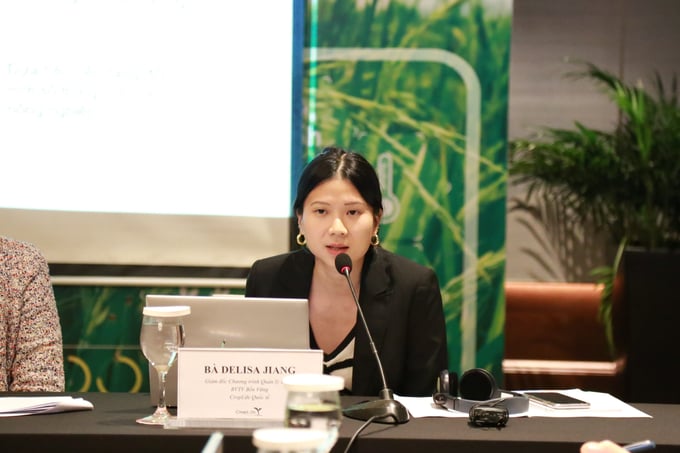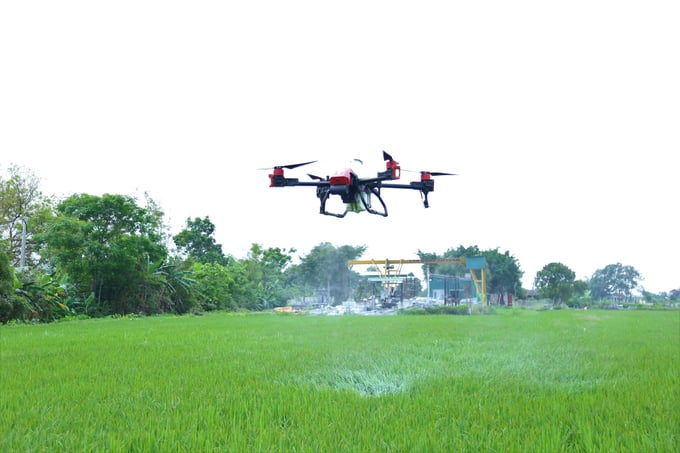November 27, 2025 | 22:02 GMT +7
November 27, 2025 | 22:02 GMT +7
Hotline: 0913.378.918
November 27, 2025 | 22:02 GMT +7
Hotline: 0913.378.918

Overview of the dialogue and press conference of CropLife Vietnam. Photo: Lam Hung.
On July 10, CropLife Vietnam held a meeting and dialogue with the press and announced agricultural projects in Vietnam in the near future. The most important of which is the cooperation program with the Ministry of Agriculture and Rural Development in the field of pesticide management.
Tran Thanh Vu, Co-Chairman of CropLife Vietnam, said that the Sustainable Pesticide Management Framework (SPMF) is a continuation of the success of previous programs that CropLife Vietnam has implemented, but will be more extensive in the field of pesticides management.
CropLife will soon have working sessions with leaders of the Ministry of Agriculture and Rural Development and particularly the Department of Plant Protection for an in-depth exchange of project information. The Co-Chairman of CropLife Vietnam hopes to receive support from the Ministry of Agriculture and Rural Development to come to an agreement on the next strategic cooperation framework and finalize the plan to prepare for the implementation of the projects by the end of the year.

Delisa Jiang, SPMF Program Director, answering press questions about the program’s content. Photo: Lam Hung.
Sharing more with the press about the mentioned program, Delisa Jiang, SPMF Program Director, said that the program was built on three basic pillars, including reducing dependence on highly hazardous pesticides (HHP, as defined under the FAO Code of Conduct on Pesticide Management) to ensure risk management measures. This is also to make sure that pesticide products can continue to meet essential use demands.
The second is to strengthen innovation and build an appropriate legal environment to increase farmers' access to modern tools, methods and technologies in terms of plant protection. The final aspect is to guide and train farmers on best practices in pesticide use and management while encouraging the supply chain to use and manage pesticides responsibly.
At the event, a press question raised the issue that farmers cannot access quality pesticide products due to the current market's abundance of fake and poor quality products and price differences, thus causing great damage to them. Delisa Jiang said that the project is always careful in choosing partners and pesticide retailers to ensure that all farmers are fully provided with the product information and use instructions which are available on the packaging, thereby minimizing damage when buying pesticides.

The use of drones to spray pesticides is highly effective, thus applied by CropLife on many models of the project. Photo: Lam Hung.
Communication through digital channels is also one of the ways to bring quality products closer to farmers, helping them better understand the benefits of using the product and its effects. This will help farmers effectively improve the quality of the crop and increase the yield. "When buyers compare pesticide products, they are not only looking at price, they also understand that there are benefits to using products from trusted and reputable brands," said Delisa Jiang.
The Sustainable Pesticide Management Framework (SPMF) is a proactive, long-term engagement that supports low- and middle- income countries in their responsible use of pesticides and provides access to climate-smart crop protection innovations to smallholder farmers. Expanded access to the newest innovations in crop protection allows farmers to increase their resilience to climate change and maintain or grow their productivity, often while preserving soil health and carbon sequestration.
By combining best practices in regulatory and stewardship, the SPMF creates an enabling environment for innovation; builds an infrastructure that supports sustainable pesticide management through poison centers, incident reporting, container management programs, and anti-counterfeit activities; and helps farmers respond to climate crises through accelerated access to the latest crop protection chemistries. With an investment of $13 million over five years, the SPMF launches in nine priority low- and middle-income countries, beginning in 2022 in Kenya and Morocco.
According to the Quang Binh Department of Agriculture and Rural Development, the environmental pollution occurring in the present agroproduction scene mainly comes from the unreasonable use of fertilizers and pesticides and the process of discharging waste bottles and packaging to the environment. The amount of pesticide packaging discharged into the environment is estimated at 4 - 4.5 tons, while the collection and destruction of bottles and packaging is low (approximately 10% of the discharged amount).
In the near future, Quang Binh Department of Agriculture and Rural Development will focus on directing the state management of fertilizer and pesticide trading; increase inspections, guide establishments producing, trading and using fertilizers and pesticides to comply with regulations on environmental protection during their operation.
Quang Binh Department of Agriculture and Rural Development has also directed the Quang Binh Agricultural and Fisheries Extension Center to organize many specialized training courses on the safe and effective use of pesticides, guiding farmers on the collection and treatment of fertilizer and pesticide packaging after use to raise their awareness of environmental protection.
Translated by Samuel Pham

(VAN) According to Mr. Vo Minh Thanh, Director of the Tay Ninh Department of Agriculture and Environment, Resolution 57 has created a new development pathway for the locality, shifting from traditional toward modern agriculture.
/2025/11/26/4909-2-154329_878.jpg)
(VAN) Pearl grouper farming in HDPE cages not only delivers economic efficiency but also contributes to protecting the environment, creating jobs, and promoting marine-based experiential tourism.

(VAN) The model of making a living under the forest canopy through the agroforestry system in Van Son commune, Bac Ninh province, is expected to generate an annual income of approximately VND 30 million/ha.

(VAN) Many enterprises in Can Tho are harnessing natural energy and reducing greenhouse gas emissions in their production processes, thereby contributing to the promotion of a sustainable green transition.
/2025/11/24/3536-2-112800_176.jpg)
(VAN) Dong Nai now has tens of thousands of hectares of forests certified for sustainable management, and this area will continue to be expanded in the coming period.

(VAN) Vinh Ha hamlet (Dai Xuyen commune, Hanoi) is shifting away from small-scale farming as households adopt bioscurity into their breeder chicken models.

(VAN) Heavy rains make aquatic species more vulnerable to disease. Proactive water management and high-tech systems help farmers prevent outbreaks and protect yields.